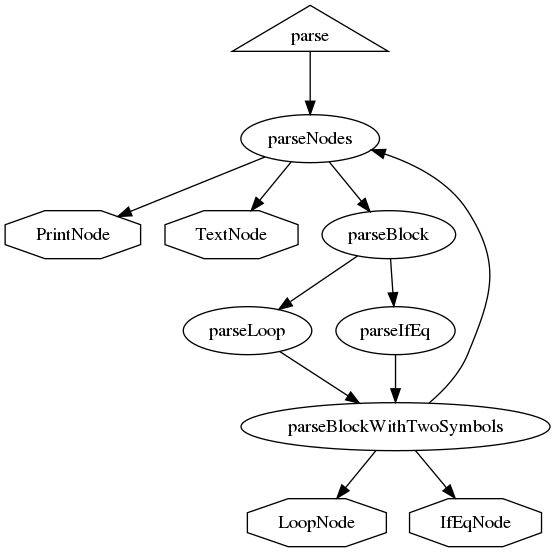carender renders a car template with provided variables to create a text output.
On a system that can run binaries built on debian:stretch, run the following commands to see a rendered template:
./build_in_docker.sh
cd from_docker/bin
RANGE_SYMBOLS=../../examples/fruits/ranges.txt SYMBOLS=../../examples/fruits/symbols.txt ./carender ../../examples/fruits/template.car- No third-party library dependencies except libc/libc++/STL.
- No lexer/parser generators.
- Target C++14 standard.
- Having fun throughout the development process.
OOP design patterns, SOLID and DRY principles are observed as far as possible in the limited time that was allocated to this project. That is, except test and cmd folders. There is a lot of code duplication in tests and there are no tests in cmd.
- No unused code.
- No commented-out code.
- Target recent g++ and clang++ versions.
- Target 100% unit test branch coverage.
- There are two types of template symbols, string (
Renderer::symbols) and strings (Renderer::rangeSymbols).
carender consists of a lexer, a parser, a renderer and a command line tool that uses these components as an example.
Lexer reads an istream and ignores whitespace in non-text context, e.g. between START_DIRECTIVE and START_BLOCK in {{ #loop range element}}. Inside text content, lexer does not ignore whitespace. For this purpose, lexer keeps track of the state as "inside START_DIRECTIVE or not" and "inside START_BLOCK/END_BLOCK or not".
Entry point is the public lex method:
bool lex(std::istream &input, std::vector<Token> &output, std::ostream &error);Parser is a hand-written recursive-descent parser that generates four types of nodes:
TextNode, PrintNode, LoopNode, IfEqNode.
Entry point is the public parse method:
std::vector<std::unique_ptr<Node>> parse(const std::vector<Token> &tokens, std::ostream &error)Simplified Parser method call graph:
Notes:
parseBlockmethod choses the parser method to dispatch for a block based on the keyword (loopandifeq) from thekeywordParsermap defined in theParser.- To reduce code duplication, common functionality of
parseLoopandparseIfEqare moved to the template member method,parseBlockWithTwoSymbols. - Parser is tested with the Lexer's output and separately with manually crafted Token streams that the lexer may not generate, in
test_parser.cpp.
Renderer implements the Visitor Pattern to consume a stream of nodes from the parser.
Entry point is the public visit methods called from the accept methods on nodes:
node->accept(renderer);Data flow using lexer, parser and renderer:
make all
A Makefile is used for building, testing and coverage reporting.
make targets:
lib: To build the static library.test: To build unit tests.cmd: To build example command-line tool.docs: To build doxygen documentation.clean: Remove build artifacts.cover: Build unit tests with coverage instrumentation, run tests to collect coverage information and create html reports intest_coveragefolder.cover-show: Buildcoverand display index withfirefox.
Set CXX environment variable to use a different compiler. Tested with recent clang++, afl-g++, afl-clang++ versions.
make test && bin/test
- catch2 chosen for unit testing. It is a header-only library and easy to add to a project.
make cover
g++and lcov for coverage reports. Coverage reporting is not supported when building withclang++.- To increase branch coverage, compiler-generated unreachable destructor branches are excluded with
LCOV_EXCL_STARTandLCOV_EXCL_STOPmarkers.
carender can be linked as a static library. A command line tool is provided as an example of using the library.
Warning: Only tested on Ubuntu 18.04 and Debian Stretch.
- A
Dockerfileadded to document the build steps in a reproducible manner. Runbuild_in_docker.shto build, test and create coverage reports.
Driver API is designed to be batteries-included, for consumers that do not want to configure subcomponents (lexer, parser, renderer) separately.
#include "driver.hpp"
#include <fstream>
// symbols and rangeSymbols are unordered_map instances defining valid symbols and their values for the template.
auto driver = car::driver::Driver(symbols, rangeSymbols, std::cout, std::cerr);
auto templ = std::ifstream("template.car");
if(driver.Render(templ)) {
// We have the template rendered to the `output` stream, `std::cout` in this case.
return;
}
// There were some errors, they are written to the `error` stream, `std::cerr` in this case.See the sample application for an example usage of the Driver API at main.cpp
Low-level API allows for configuration of the subcomponents. New options may be added in new versions.
Lexer consumes an input stream and emits a stream of tokens as a std::vector<car::lexer::Token>. See test_lexer.cpp and driver.cpp for usage examples.
auto lexer = car::lexer::Lexer();
auto tokens = std::vector<car::lexer::Token>();
lexer.lex(input, tokens, error);Parser consumes a token stream and emits a stream of nodes as a std::vector<std::unique_ptr<Node>>. See test_parser.cpp and driver.cpp for usage examples.
auto options = ParserOptions(symbolNames);
auto parser = Parser(options);
auto nodes = parser.parse(tokens, error);Renderer consumes a node stream and emits text. See test_renderer.cpp and driver.cpp for usage examples.
auto renderer = Renderer(symbols, rangeSymbols, output, error);
for (auto const &n : nodes)
{
n->accept(renderer);
}Hello {{name}},
{{#loop items item}}
I like {{item}}{{#ifeq item favorite}} very much{{/ifeq}}.
{{/loop}}
Cheers!
name: "Donald"
items: ["apples", "pineapples", "oranges"]
favorite: "pineapples"
Hello Donald,
I like apples.
I like pineapplesvery much.
I like oranges.
Cheers!
In an approximate E-BNF:
TEMPLATE = TEXT | PRINT | LOOP | IFEQ
CHILDREN = TEMPLATE
START_DIRECTIVE = "{{"
END_DIRECTIVE = "}}"
START_BLOCK = "#"
END_BLOCK = "/"
SYMBOL = TEXT
TEXT = a string not containing START_DIRECTIVE
PRINT = START_DIRECTIVE, SYMBOL, END_DIRECTIVE
LOOP = START_DIRECTIVE, START_BLOCK, "loop", END_DIRECTIVE, CHILDREN, START_DIRECTIVE, END_BLOCK, "loop", END_DIRECTIVE
IFEQ = START_DIRECTIVE, START_BLOCK, "ifeq", END_DIRECTIVE, CHILDREN, START_DIRECTIVE, END_BLOCK, "ifeq", END_DIRECTIVE


